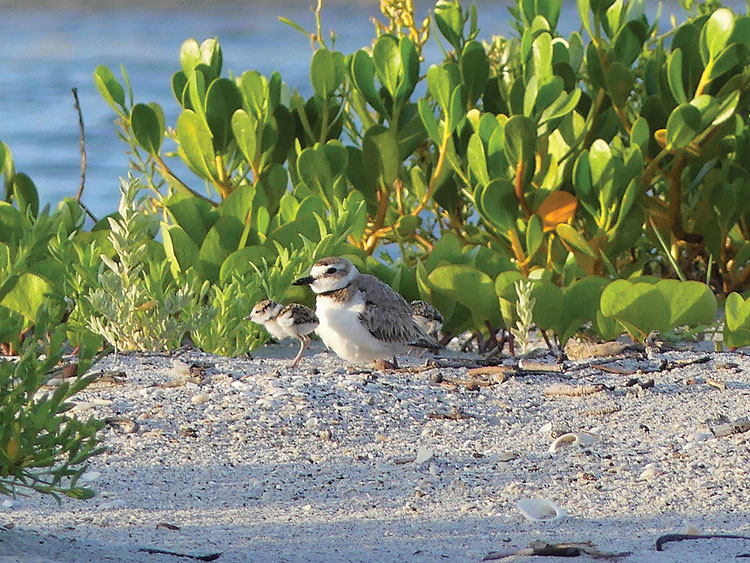Our Nesting Shore Birds
June 27, 2024 at 12:09 p.m.

Beachgoers and boaters who frequent Stump Pass Beach State Park are probably familiar with the shorebird nesting area at the southern end of the park at Stump Pass. From spring through mid-summer, many bird species use this area for nesting. During this time, the area is roped off & marked to keep humans and dogs away so the birds can nest, incubate their eggs and care for the hatchlings until they fledge.
This year’s nesting season at Stump Pass was disappointing as only one pair of Wilson’s plover and Killdeer, an American plover, successfully nested. The Wilson’s plover nest produced two eggs but only one chick has survived and even though it can fly short distances, it will stay with its parents for another couple of weeks. The Killdeer lost all four chicks, and sadly, a second nest attempt with four eggs failed. Across the pass, the nesting season has proved more productive on Knight Island, perhaps because there is less foot and boat traffic.
The shorebirds who nest along area shorelines are often migrating from their winter homes up to where they spend their summers. Least Terns migrate each spring from South America to nest here. Unbelievable, right? Snowy plovers, Wilson’s plovers, American Oystercatchers and Black Skimmers do live here year round, but move from their winter grounds to congregate on beaches like Stump Pass to breed.
Due to development, birds are now seeking out other locations to breed and make their nests. Almost one half of all nesting Least Terns now nest on gravel rooftops as do some American Oystercatchers and Black Skimmers. In Venice, a rooftop Least Tern nest with chicks was wiped out by a Great Horned Owl so even a location up out of human reach isn’t guaranteed safe. If you happen to notice birds that appear to be nesting on a rooftop, contact the Florida Fish & Wildlife Commission at 888-404-3922 so the site can be monitored.
Without active protection on the part of humans, these imperiled birds may not survive into the future. Please give some thought to small steps you can take to help raise the success and survival rate for nesting shorebirds. Beachgoers are asked to stay a respectful distance back from roped off areas as birds may become spooked and fly off, leaving their eggs exposed to the sun & heat that can fry them (you know how hot the sand becomes if you try to walk barefoot during the day). Exposed eggs & chicks are easy prey for predators from gulls & other birds to crabs, raccoons, and coyotes. If birds start flying around you or divebombing you, leave the immediate area as they may be swarming to protect their chicks. Heed their warning that you are too close. Other easy steps are not leaving food and trash behind as it attracts predators to the area. Pick up discarded fishing line that may entangle birds. Keep your dog away from nesting areas as the birds view dogs as a predator and your dog may damage nests running through roped off areas and even cause birds to abandon their nests. Please keep fireworks away from the beach as they will strike terror into birds and disorient nesting sea turtles. Educate your children not to run into a flock of nesting birds and cause them to flush. It’s not fun for the birds!
Volunteers are always welcome to help protect and monitor the shorebirds along area waterways. If you would like to learn more about these opportunities, here are some groups to check out. The Florida Shorebird Alliance helps to coordinate the efforts of many organizations statewide to protect shorebirds and is a great resource for volunteer information (flshorebirdalliance.org). FWC’s Imperiled Beach Nesting Bird monitors and beach stewards educate the public and collect data that is used to help set conservation policy (myfwc.com/license/wildlife/ibnb). The Florida Audubon Society is another group involved with monitoring bird numbers and nesting data (fl.audubon.org).
All birds are protected under the Federal Migratory Bird Treaty Act. If you happen to witness someone purposely harassing or disturbing shorebirds or other wildlife, call the FWC Wildlife Alert number at 888-404-3922 or text [email protected].